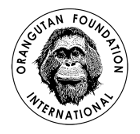Although the main purpose of OFI’s Orangutan Care Center & Quarantine (OCCQ) in Pasir Panjang is to rehabilitate and care for orphan orangutans, there are a surprising number of animals that bear no resemblance to our red-haired primate cousins. Clearly, it is not only orangutans that are falling victim to the ongoing forest destruction and… Continue reading New Arrivals: Small Ape and Bear
Month: November 2010
An Unusual Family at the Care Center
Protecting large areas of orangutan habitat is an incredibly difficult task. Even after an area has been designated a national park, or purchased privately for the sake of conservation, an endless amount of humanpower and resources are continuously spent to keep illegal loggers, miners, and poachers out of the forest. However, by hiring rangers to… Continue reading An Unusual Family at the Care Center
OFI’s Forest Protection Initiative: Direct Purchase of Forests
Habitat conservation is a vital aspect of any wildlife conservation program. This is for the simple reason that without habitat, there would be no wildlife. Without a safe and protected environment, rehabilitated animal releases would simply not be possible. Unfortunately, this aspect of conservation is extremely difficult in a country where wildlife habitat disappears by… Continue reading OFI’s Forest Protection Initiative: Direct Purchase of Forests



